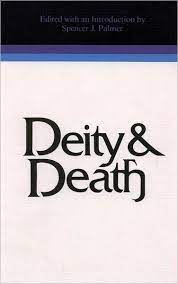Articles/Essays – Volume 12, No. 2
The Last Anecdotes | Spencer J. Palmer, ed., Deity and Death
This book includes seven essays, divided into two groups. The first three essays, collected under the heading, “Death and Dying,” deal with a variety of practices, attitudes and beliefs on the significance of death and appropriate ways of dealing with death. The last four essays, under the heading “Deity and the Divine”, include a comparative study of ascension motifs, a comparison of the roles of reverence for life in Eastern and Western religions and studies on the origins and character of some major aspects of religious thought in Japan and China. While the range of topics discussed is very extensive, the combination is not implausible. We might expect discussion of the institutions for dealing with death in a given society to reveal some important characteristics of predominant religious attitudes and beliefs in that society. And we might expect an investigation of religious attitudes and beliefs to explain some aspects of institutions dealing with death. All the essays are short, congenial and easily read. They tend to be anecdotal, with a potpourri of facts, conjectures and suggestions. The reader can come away with interesting tidbits such as he might gain from an evening’s casual conversation with the authors. Such a conversation is not without its rewards, and if the collection is approached in anticipation of such rewards, it will be worth reading.
On the other hand, those who are seriously attempting to come to grips with the issues upon which these essays touch are likely to be disappointed. The information and suggestions could be made more significant to the serious reader by bearing on the individual or social needs which various practices or attitudes seem to serve: whether those needs are basic to human nature or are products of particular social structures. They might bear on whether or not institutions, attitudes and beliefs are designed intentionally to serve certain needs, or whether they simply have sprung from past successes. Questions could be raised about the effectiveness of various institutions in dealing with these needs. Other questions could be raised about the internal consistency of beliefs, attitudes and practices. One could explore philosophical or theological arguments for or against the coherence, appropriateness or moral correctness of the attitudes and institutions considered.
Each of these issues calls for its own methodological approach, employing the arguments and evidence appropriate to it. But these issues are not distinguished clearly in these essays, nor are they supported by evidence or argument. In fact, the essays are so anecdotal that they even fail to provide guidelines for informed speculation.
Although these essays were not intended to be technical papers, the scholars who wrote them could have outlined some of the ways in which their information could contribute to a better grasp of basic issues. It is regrettable that they did not do so.
Deity and Death. Edited by Spencer J. Palmer. Provo, Utah: Brigham Young University Press, 1978, 156 pp. $5.95.


 Back to full Issue
Back to full Issue

